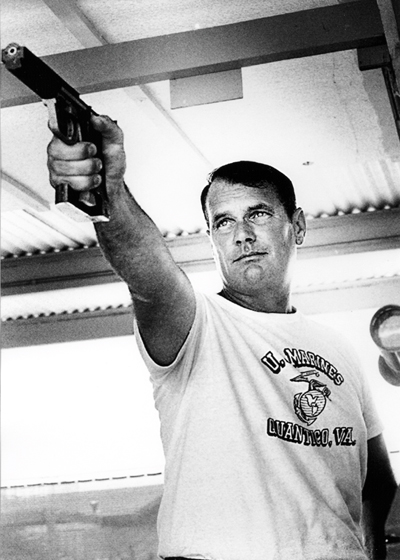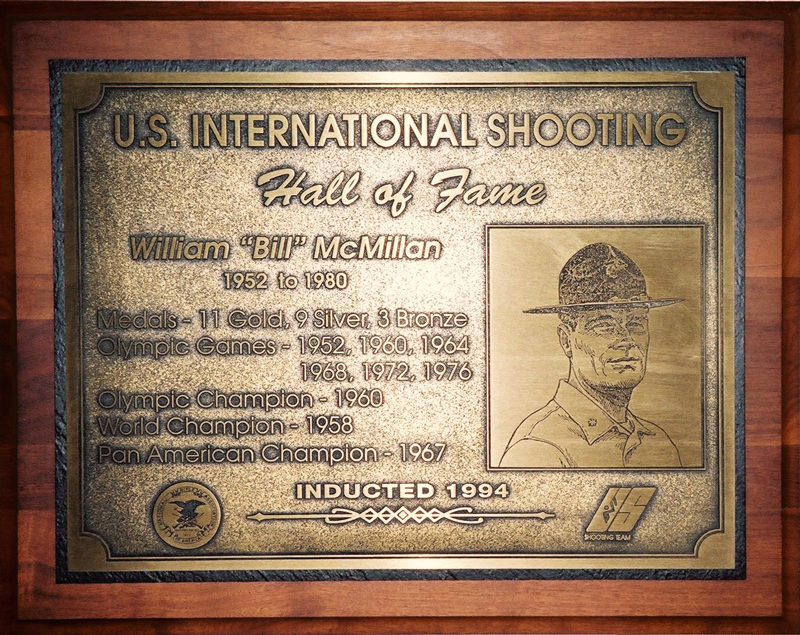The U. S. International Shooting Hall of Fame was established in 1991 by the NRA International Competitions Committee. Selection criteria was established that limited selection to those that had excelled in international competition over an extended period of time. There was also consideration given to those shooters in pre-1948 competitions and those who had served the U.S. Shooting Team in administrative or coaching positions. To be eligible the person must have been retired from active international shooting at least five years.
The first inductees were the four USA shooters that had each won at least two individual Olympic Gold Medals. Inductees were honored at ceremonies hosted by the U.S. Shooting Team Foundation at the SHOT Show each January. USA Shooting took over the program in 1994. The name was changed in 1998 to the USA Shooting Hall of Fame and the induction ceremonies were moved to the USA Shooting National Championships. In 2004 the election was changed to Olympic years only and they resumed being held at the SHOT Show. Living USA Shooting Hall of Fame members and the USA Shooting Board of Directors vote on the selections.
USA Shooting Hall of Fame
Osburn forgotten Olympian
By Jack Spaulding, Correspondent
Spaulding outdoors
News surrounding the Olympic effort in women's figure skating has been the rage in conversation and media coverage for weeks. Ask anyone on the street to name a few Olympic competitors that come to mind and you will most likely hear the names "Harding" and "Kerrigan."
And, overall, Mark Spitz is still fresh in people's minds as one of the winningest athletes in Olympic history.
but few people realize that Spitz's great success only tied an existing record for winning Olympic medals.
The first Olympian to set the medals record (11) was Navy Capt. Carl "Cy" Osburn. Osburn is said to have shunned the limelight, but his shooting skills have won him lasting recognition in the American movement.
In three Olympics (1912, 1920, 1924), the career Navy officer raked in five gold, four silver and two bronze medals in individual and team rifle competition. Today, Osburn and Spitz share the record for the most Olympic medals won by an American.
Osburn holds the record for winning more Olympic gold medals (five) than any other U.S. shooter.
Osburn graduated from the U.S. Naval Academy in 1906, then divided his career for the next 14 years between shooting assignments at Camp Perry, various tours of duty, and work as the instructor of small arms practice at Annapolis. He commaned the presidential yacht, the U.S.S. Mayflower, from 1915-20.
He retired in his adopted home of St. Helena, Calif., and spent his final years with his wife enjoying the life of a fruit, flower and vegtable gardner. After suffering a stroke on Dec. 28, 1966, Osburn died at age 82.
A man who always refused to bask in his own glory, for him it was fitting that he faded from Olympic fame and ultimately from like with quietness and dignity.
On Jan. 15, Osburn was given American shooting's highest honor when he was posthumously inducted into the U.S. International Shooting Hall of Fame at the Shot Show in Dallas, Texas.
The Daily Journal, Franklin, Indiana, Friday, February 11, 1994, Page 5

Courtesy of National Rifle Association of America
Bill McMillan Enters Shooting Hall of Fame
Story by Karen Mutka, PR Director, U.S. Olympic Shooting Center, Colorado Springs, Colo.
Olympic pistol shooter, retired Marine Lieutenant Colonel William W. McMillan was inducted into the U.S. International Shooting Hall of Fame at a ceremony in Dallas on Jan. 15.
Also inducted was the late Carl "Cy" Osburn, a Navy captain, who fired in the Olympics of 1912, '20 and '24.
"They're an amazing pair of athletes who helped put shooting on the map with America's Olympic community," said U.S. Shooting Team Director and fellow Hall of Famer Lones Wigger. "They are two big reasons why the USA has won more Olympic shooting medals than any nation on earth."
Bill McMillan began his pistol shooting career with a rifle. As a young Marine in 1949, he tried his luck with a pistol for the first time during the Eastern Division Marine Corps Rifle and Pistol Matches. He later said "it was made for me."
Known for his cool under pressure, McMillan quickly began winning. In 27 years of international pistol competition, he brought home 11 gold medals, nine silver, three bronze, and two world records.
He competed in six World Championships, four Pan Am Games, and six Olympic Games - a mark equaled by only three other Americans. "For the most part, I specialized in one international event, rapid fire, and I think that's how I was able to stay on top for so long," he said. "Now, people shoot four or five guns, and you just can't do that."
McMillan took the 1958 world rapid-fire [center-fire] pistol title, then won a three-way shoot-off for the rapid-fire gold medal at the 1960 Olympics in Rome.
"For some reason I wasn't overly nervous (at the Olympics), and we had two hours until the shoot-off so I took a nap," he said. "I always used to see (fellow Marine and twice winner of the Olympic decathlon) Bob Mathias lie down on a blanket between each of his events, and I took a page from his book, I guess.... I think it kind of unnerved the other shooters. In any case, I won."
He would have had an unbroken string of Olympic competition from 1952 to 1976, but he missed the 1956 Olympic Games. "My gun jammed twice during the try-outs, and I was disqualified. I felt bad because I was shooting good and about 20 points ahead. Plus, I wanted to make that trip to Australia"
Born in Frostburg, Md., in 1929, McMillan grew up in Turtle Creek, near Pittsburgh, Pa. He enlisted in the Marine Corps in 1946 and saw action as an infantryman in Korea in 1952. He returned as a staff sergeant and was selected for a commission to second lieutenant in 1953.
Over the next 15 years, he served as a range officer at marksmanship units at Camp Matthews, Calif., and Quantico, Va. He spent most of 1969 as an ordnance officer in Vietnam and was awarded the Bronze Star.
"I'm grateful to the Marines for giving me the time and facilities to shoot, but to be honest, I spent most of my time shooting three-gun and the American events. It was only every three or four years - at the Olympics, the Pan Am Games, or the World Shooting Championships - that I shot the international events.
"In the Marines, I went to Japan, Vietnam... but for international competitions I got to go to Cairo, Moscow, Germany, Sweden, Finland, a lot of good places."
McMillan, who never had a formal coach, said his greatest inspiration was Hungarian rapid-fire pistol shooter Karoly Takacs. After losing his right hand in a grenade accident in 1938, Takacs taught himself to shoot left-handed, then came back to win the Olympic rapid-fire crown in 1948 and 1952.
McMillan retired as a lieutenant colonel in 1974, then took a position as a San Diego County sheriff. He was forced to retire six years later after being injured in the line of duty.
Now, at 65, he resides in Encinitas, Calif. Although his awards and memorabilia fill walls and bookshelves in his home, McMillan admitted, "I never really look at them now. I've good memories of my career, but I try not to dwell on them too much."
Leatherneck Magazine, March 1994

U.S. International Shooting Hall of Fame
Dallas Convention Center
January 15, 1994
Click the play button to start
[Runtime 37:20 mins]